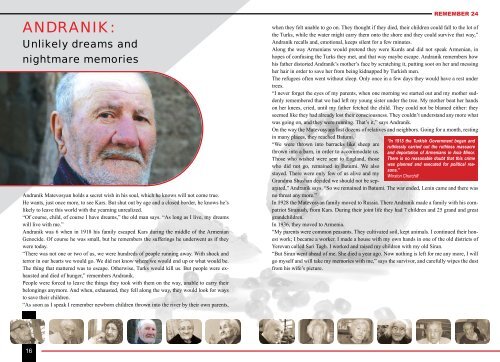Remember 24 - Genocide Survivors - ArmeniaNow.com
Remember 24 - Genocide Survivors - ArmeniaNow.com
Remember 24 - Genocide Survivors - ArmeniaNow.com
You also want an ePaper? Increase the reach of your titles
YUMPU automatically turns print PDFs into web optimized ePapers that Google loves.
ANDRANIK:Unlikely dreams andnightmare memoriesAndranik Matevosyan holds a secret wish in his soul, which he knows will not <strong>com</strong>e true.He wants, just once more, to see Kars. But shut out by age and a closed border, he knows he’slikely to leave this world with the yearning unrealized.“Of course, child, of course I have dreams,” the old man says. “As long as I live, my dreamswill live with me.”Andranik was 6 when in 1918 his family escaped Kars during the middle of the Armenian<strong>Genocide</strong>. Of course he was small, but he remembers the sufferings he underwent as if theywere today.“There was not one or two of us, we were hundreds of people running away. With shock andterror in our hearts we would go. We did not know where we would end up or what would be.The thing that mattered was to escape. Otherwise, Turks would kill us. But people were exhaustedand died of hunger,” remembers Andranik.People were forced to leave the things they took with them on the way, unable to carry theirbelongings anymore. And when, exhausted, they fell along the way, they would look for waysto save their children.“As soon as I speak I remember newborn children thrown into the river by their own parents,when they felt unable to go on. They thought if they died, their children could fall to the lot ofthe Turks, while the water might carry them onto the shore and they could survive that way,”Andranik recalls and, emotional, keeps silent for a few minutes.Along the way Armenians would pretend they were Kurds and did not speak Armenian, inhopes of confusing the Turks they met, and that way maybe escape. Andranik remembers howhis father distorted Andranik’s mother’s face by scratching it, putting soot on her and messingher hair in order to save her from being kidnapped by Turkish men.The refugees often went without sleep. Only once in a few days they would have a rest undertrees.“I never forget the eyes of my parents, when one morning we started out and my mother suddenlyremembered that we had left my young sister under the tree. My mother beat her handson her knees, cried, until my father fetched the child. They could not be blamed either: theyseemed like they had already lost their consciousness. They couldn’t understand any more whatwas going on, and they were running. That’s it,” says Andranik.On the way the Matevosyans lost dozens of relatives and neighbors. Going for a month, restingin many places, they reached Batumi.“We were thrown into barracks like sheep arethrown into a barn, in order to ac<strong>com</strong>modate us.Those who wished were sent to England, thosewho did not go, remained in Batumi. We alsostayed. There were only few of us alive and myGrandma Shushan decided we should not be separated,”Andranik says. “So we remained in Batumi. The war ended, Lenin came and there wasno threat any more.”In 1928 the Matevosyan family moved to Russia. There Andranik made a family with his <strong>com</strong>patriotSiranush, from Kars. During their joint life they had 7 children and 25 grand and greatgrandchildren.In 1936, they moved to Armenia.“My parents were <strong>com</strong>mon peasants. They cultivated soil, kept animals. I continued their honestwork; I became a worker. I made a house with my own hands in one of the old districts ofYerevan called Sari Tagh. I worked and raised my children with my old Siran.“But Siran went ahead of me. She died a year ago. Now nothing is left for me any more, I willgo myself and will take my memories with me,” says the survivor, and carefully wipes the dustfrom his wife’s picture.


